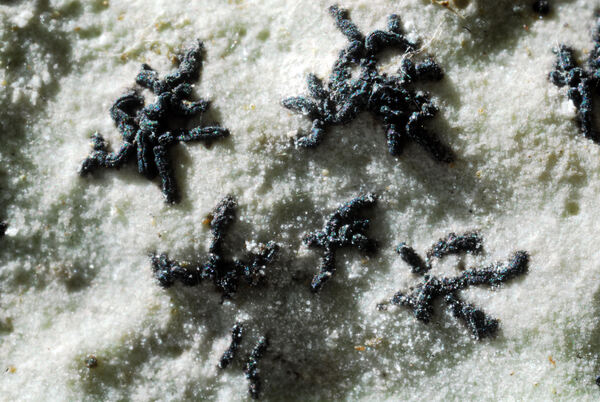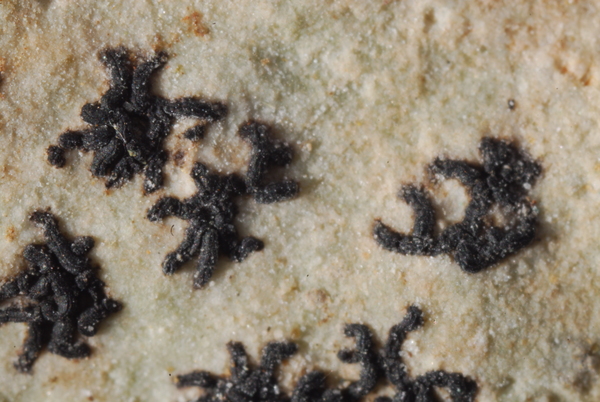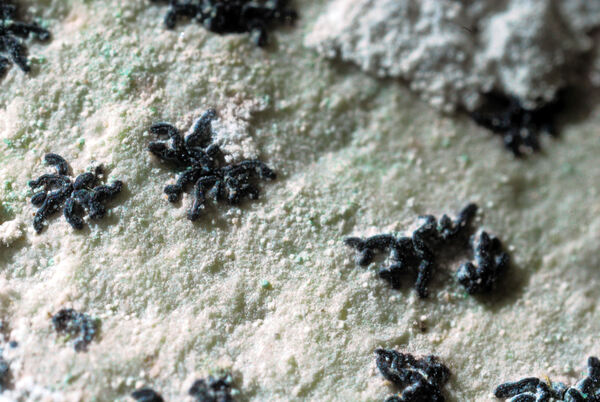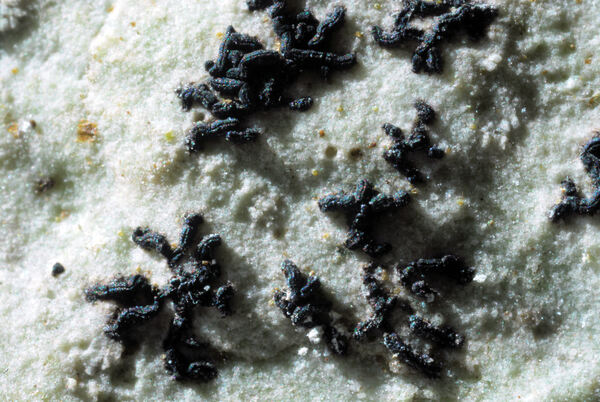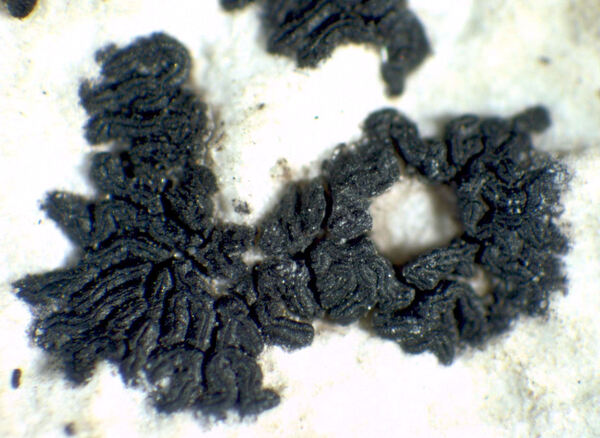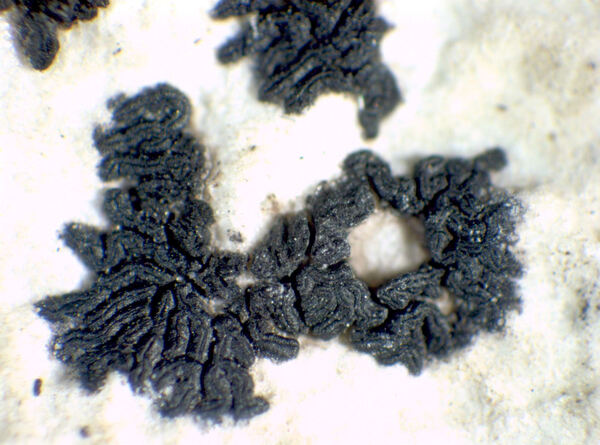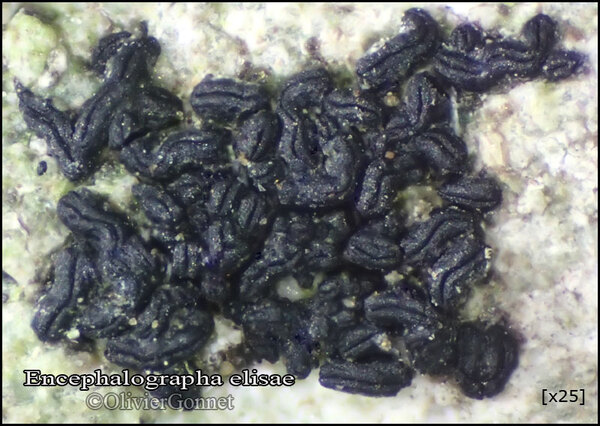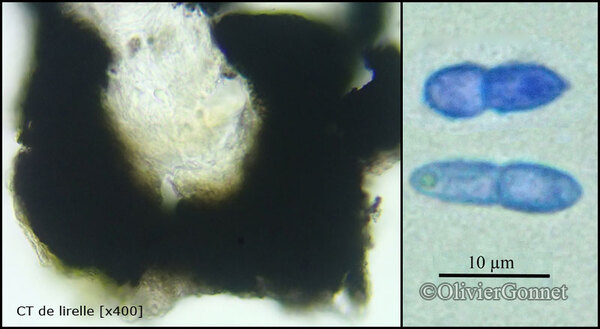Encephalographa elisae A. Massal.
Geneac. Lich.: 13, 1854.
Synonyms: Encephalographa cerebrina f. caesia Anzi; Encephalographa cerebrina var. elisae (A. Massal.) Anzi; Encephalographa rubiformis A. Massal.; Melaspilea rubiformis (A. Massal.) Redinger
Description: Thallus crustose, endosubstratic, poorly evident, yellowish white, often delimited by a black prothallus. Apothecia lirelliform, black, epruinose, 0.3-1 x 0.1-0.2 mm, simple or weakly dichotomously branched, laterally anastomosing, straight to curved, prominent, aggregated into 2-3 mm wide, stellate to irregular clusters of 10-20 apothecia, with a slit-like disc. Proper exciple dark brown to black, extending below the hymenium, brittle, the external layer of cells c. 2-3 µm wide, with strongly occluded lumina; epithecium brown; hymenium colourless, I- or I+ yellowish; paraphysoids highly branched and densely anastomosing, c. 2 µm thick; hypothecium dark. Asci 8-spored, clavate, bitunicate, with an evident ocular chamber, K/I- (but cytoplasm usually yellowish brown). Ascospores 1-septate, slightly constricted at septum, one cell slightly shorter and wider than the other, at first hyaline then pale brown, 12-16 x 4-6 µm, with a very thin perispore, the wall ornamented. Pycnidia frequent, half to totally immersed, carbonaceous in upper part, colourless in lower part, producing either macro- or microconidia. Macroconidia simple, ellipsoid, 7-11 x 3-5 µm; microconidia narrowly ellipsoid to bacilliform, 4-8 x 1-2.5 µm. Photobiont trentepohlioid. Spot tests: K-, C-, KC-, P-, UV-. Chemistry: without lichen substances.
Growth form: Crustose
Substrata: rocks
Photobiont: Trentepohlia
Reproductive strategy: mainly sexual
Most common in areas with a humid-warm climate (e.g. most of Tyrrenian Italy)
In underhangs rarely wetted by rain
Commonnes-rarity: (info)
Alpine belt: absent
Subalpine belt: absent
Montane belt: absent
Dry submediterranean belt: very rare
Humid submediterranean belt: rare
Padanian area: absent
pH of the substrata:
1 2 3 4 5
Solar irradiation:
1 2 3 4 5
Aridity:
1 2 3 4 5
Eutrophication:
1 2 3 4 5
Poleotolerance:
0 1 2 3
Altitudinal distribution:
1 2 3 4 5 6
Rarity
absent
extremely rare
very rare
rare
rather rare
rather common
common
very common
extremely common
Loading data...
Occurrence data
Predictive map
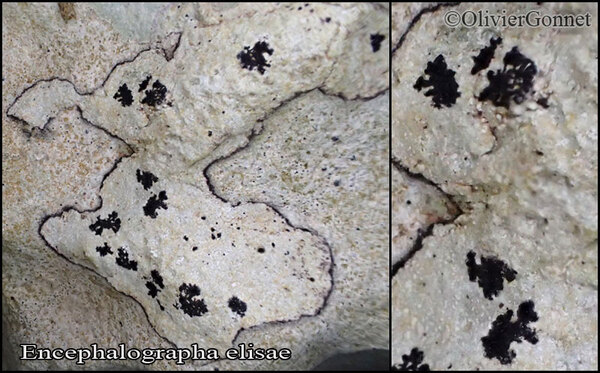
Courtesy Danièle et Olivier Gonnet - Source: https://www.afl-lichenologie.fr/Photos_AFL/Photos_AFL_E/Encephalograpga_elisae.htm
France, session AFL dans le Lot - Moulin du Saut, Gramat
25/5/2015
Growth form: Crustose
Substrata: rocks
Photobiont: Trentepohlia
Reproductive strategy: mainly sexual
Most common in areas with a humid-warm climate (e.g. most of Tyrrenian Italy)
In underhangs rarely wetted by rain
Commonnes-rarity: (info)
Alpine belt: absent
Subalpine belt: absent
Montane belt: absent
Dry submediterranean belt: very rare
Humid submediterranean belt: rare
Padanian area: absent
pH of the substrata:
| 1 | 2 | 3 | 4 | 5 |
Solar irradiation:
| 1 | 2 | 3 | 4 | 5 |
Aridity:
| 1 | 2 | 3 | 4 | 5 |
Eutrophication:
| 1 | 2 | 3 | 4 | 5 |
Poleotolerance:
| 0 | 1 | 2 | 3 |
Altitudinal distribution:
| 1 | 2 | 3 | 4 | 5 | 6 |
Rarity
absent
extremely rare
very rare
rare
rather rare
rather common
common
very common
extremely common
Loading data...
Occurrence data
Predictive map



